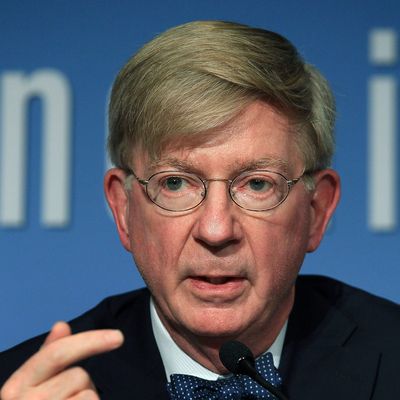
If you were skimming George Will’s Sunday column, or even if — heaven forfend! — you neglected it altogether, you missed a remarkable sentence, buried deep within Will’s slightly paranoid meanderings against Janet Yellen: “The Fed seems to be evolving into a central economic planner with a roving commission to right social wrongs such as unemployment.” This lone sentence contains so many bizarre assumptions buried within that it rewards close inspection.
The basic tension in monetary policy is between the competing goals of holding down unemployment and holding down inflation. Focusing exclusively on one runs the risk of letting the other rise out of control. Will believes the Fed should focus entirely on suppressing inflation.
Since the outset of the crisis, most conservatives have warned that the Federal Reserve is erring on the side of bringing down unemployment, risking high inflation, which is always just around the corner, or perhaps already appearing. Utterly confounding their predictions, inflation has stayed at rock-bottom levels while unemployment has remained stubbornly high. This has prompted some conservatives to rethink their hard money obsession. Will, by contrast, has responded to this empirical rebuke by growing more disdainful of the goal of creating jobs.
Now, he doesn’t want to argue straight-out that high unemployment is a positive. Rather, he waves away concerns about high unemployment as just one of a supposedly expanding list of “social wrongs” the Fed is combating. The purpose of that “such as” is to make the audience conceive of unemployment as merely heading the list of other social ills the Fed is busying itself with, but there is no “such as.” The Fed is not assigning itself the problems of single parenthood or drugs or climate change (alleged climate change, as Will would put it).
It is likewise odd that Will presents the Fed’s concern with unemployment as some kind of potential, as-yet-ambiguous emerging trend (“seems to be evolving into …”). The 1978 Humphrey-Hawkins law, passed by Congress and signed by the president, officially made low inflation and unemployment the Fed’s two goals, and was de facto policy for decades prior. To say the Fed “seems to be evolving” into an agency that combats unemployment is a bit like saying George Will seems to be evolving into some kind of political columnist.
Will’s fellow inflation alarmists often argue that the Federal Reserve’s dual inflation-unemployment mandate ought to be officially changed into a single inflation mandate. This never gets anywhere, in part because passing a law explicitly instructing the Federal Reserve to stop caring at all about unemployment might be a heavy lift in Congress. But Will’s column today doesn’t call for a revision in the law. He just wants the Federal Reserve to ignore the law because he disagrees with its ends. Will’s apparent idea is that technocrats in Washington should pursue an agenda in explicit violation of the one set out for them in a law duly passed through both chambers of Congress and signed by the president. That seems kind of contrary to the spirit of all that Constitution-rule-of-law stuff he’s always yammering about.






























